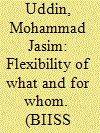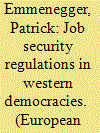|
|
|
Sort Order |
|
|
|
Items / Page
|
|
|
|
|
|
|
| Srl | Item |
| 1 |
ID:
106063


|
|
|
| 2 |
ID:
101204


|
|
|
|
|
| Publication |
2010.
|
| Summary/Abstract |
The aim of this paper is to identify proper legal provisions for regulating plant closure in Taiwan. The main argument is that an "ideal"model for such provisions can be developed by embedding the proposed law within its social context. From information obtained through in-depth interviews, I find that a proper plant closure law needs to take into consideration the demands of key actors by striking a balance between managerial prerogative and job security. The paper concludes by proposing a new approach for regulating plant closure in Taiwan.
|
|
|
|
|
|
|
|
|
|
|
|
|
|
|
|
| 3 |
ID:
103359


|
|
|
|
|
| Publication |
2011.
|
| Summary/Abstract |
This article uses fuzzy set qualitative comparative analysis (fsQCA) to examine the determinants of job security regulations - here understood as restrictions on hiring and firing - in Western democracies. Unlike previous studies, the analysis reveals three different paths to high levels of job security regulations. The first path covers the Southern European state capitalist countries. In these countries, conflicts between forces pushing for liberal democracy and groups alienated from modernisation have led to high levels of statism and crowded out other societal actors. Job security regulations were enacted relatively early in order to provide social security by means available to the state. Due to fragmented welfare states, job security regulations have remained one of the most important pillars of the social protection regime. The second path covers the Continental European managed capitalist countries and is also characterised by high levels of statism. In these countries, repressive governments employed a stick-and-carrot strategy to weaken the labour movement and tie the loyalties of the individual to the state. After the Second World War, these countries developed corporatist intermediation systems and encompassing and generous welfare states. Finally, the third path covers the Nordic managed capitalist countries. This path is characterised by a high degree of non-market coordination, strong labour movements and few institutional veto points. In the Nordic managed capitalist countries, job security regulations traditionally have been subject to collective agreements. However, in the 1960s, labour movements succeeded in pushing through the public legislation of job security despite opposition from employers' associations. Methodologically, this article demonstrates that cross-national differences in the level of job security regulations can only be explained if the methods used allow for complex causality. In contrast, methods which focus on 'net effects' do not offer satisfactory explanations for the cross-national differences in the level of job security regulations.
|
|
|
|
|
|
|
|
|
|
|
|
|
|
|
|
| 4 |
ID:
167953


|
|
|
|
|
| Summary/Abstract |
The Non-commissioned Officer (NCO) is regarded as the core of military combat
forces performing their duties at the front-line of defense, but the recent drop in
applications and enrollment of Army NCOs has hampered the acquisition and
operation of the workforce. As a way to solve this problem, the Army is paying
attention to job security and has been implementing the “Long-Term service NCO
upon commissioning” recruiting system in the second half of 2018. In this study,
we surveyed 1,492 young and active duty soldiers considering the above problems
and current situation, and empirically analyzed what factors, including occupational
safety, would undermine the applications and enrollment of Army NCOs. The
results of the analysis showed that low occupational status, low job security, a
lack of trust in the military, inadequate career and career development conditions,
uncomfortable work environment and region, and hierarchical culture of the
military have had an influence over the recent drop in applications and enrollment
of Army NCOs. In addition, the McNemar test was conducted to further analyze
the effectuality of the incentive for people to apply to become Army NCOs. As
a result of the analysis, it was confirmed that in all groups, the effect the “LongTerm service NCO upon commissioning” recruiting system was far better than the
traditional recruiting system. Based on the results of the above study, several policy
proposals have been suggested to improve the acquisition of the Army NCO.
|
|
|
|
|
|
|
|
|
|
|
|
|
|
|
|
| 5 |
ID:
143316


|
|
|
|
|
| Summary/Abstract |
Inspired by the practice of social enterprises, this article aims to understand how work integration social enterprises (WISE) function in relation to labour market integration of socially excluded persons in India. While mainly examining how socially excluded persons benefit from such interventions, questions are asked about what motivates social enterprises to get involved and to what extent they benefit themselves. Built on case study research in India, this article identifies a potential win–win situation, as members of excluded communities are empowered through the work integration approach, but social enterprises also benefit by building trust and achieving a sustainable orientation.
|
|
|
|
|
|
|
|
|
|
|
|
|
|
|
|
|
|
|
|
|